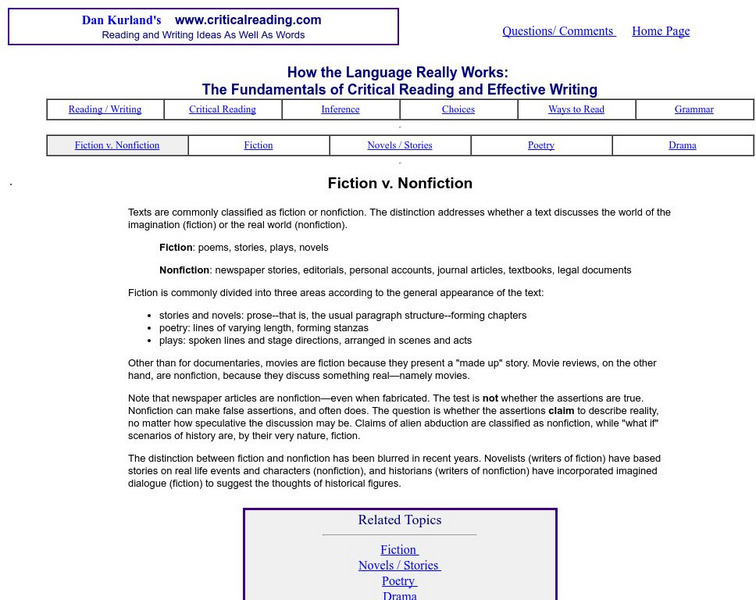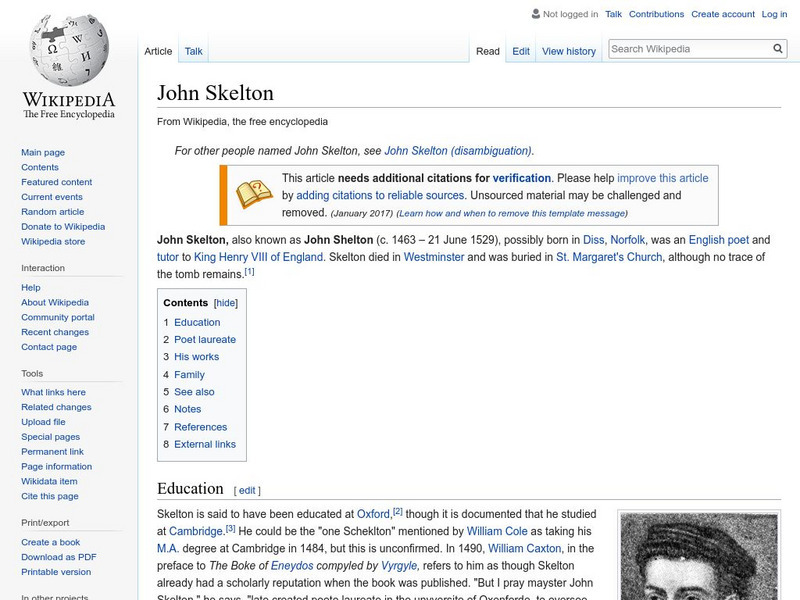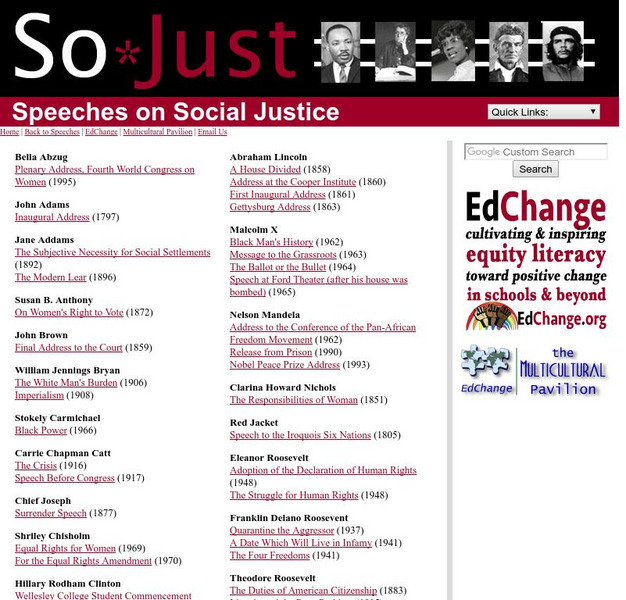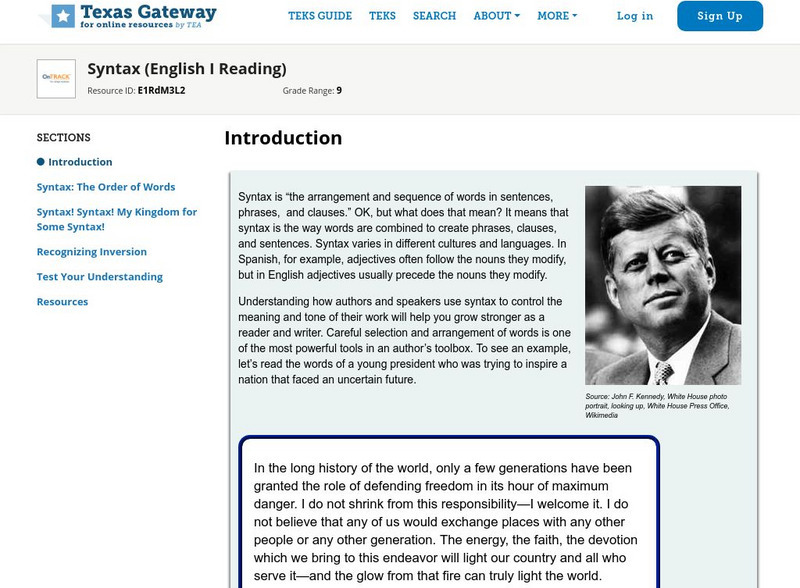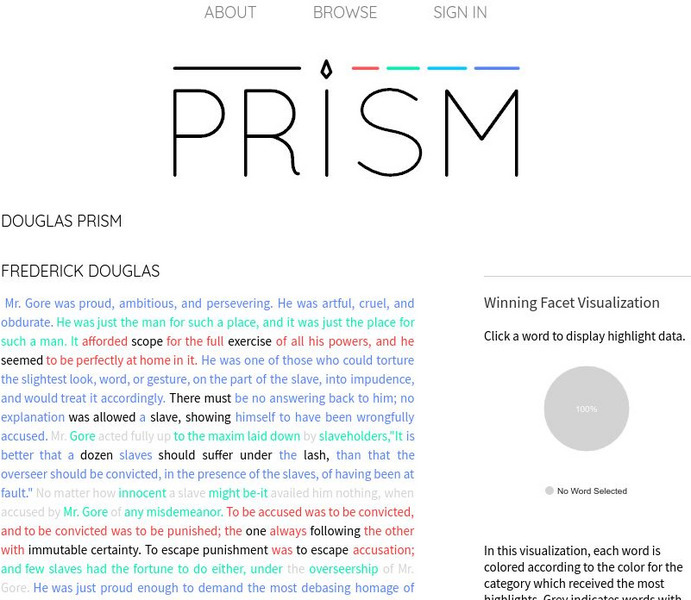Lumen Learning
Lumen: Critical Reading: Logic and Structure
This lesson focuses on structure and logic including types and purposes of essays, organizational patterns, argumentative writing, and logic and fallacies.
Other
Definition: Fiction v. Nonfiction
This writing and reading tutorial provides a detailed explanation of the difference between fiction and nonfiction in rhetoric.
ReadWriteThink
Read Write Think: Lesson Plan: Persuasive Techniques in Advertising
During this unit, students will learn about many different advertising techniques. Students will investigate the "art of rhetoric" and analyze many print, television, and online advertisements. Using the site's online tools, groups will...
Wikimedia
Wikipedia: John Skelton
This site is the Wikipedia encyclopedia entry for the British poet John Skelton (1460-1529 CE). The page has numerous in-text links to other pertinent information.
Other
So just.net: Historic Speeches
This site from EdChange.org gives the speeches of many American speakers on various topics related to social justice.
Other
In Time: Tenets of Democracy: Critical Thinking and Decision Making
This critical thinking exercise and checklist is designed for teachers and students. A lesson plan can be developed here that illustrates decision-making skills and a teacher can use examples of common problems that get in the way when...
Other
Julius Caesar: Literary Devices
Provides examples of how literary devices are used in The Tragedy of Julius Caesar. Looks at irony, motifs, themes, symbols, and how language is used.
Lumen Learning
Lumen: Boundless Communication: History of Public Speaking
This lesson offers a brief history of public speaking drawing upon the Western thought from Greece and Rome with Aristotle and Cicero. It lists and discusses the periods and the major speakers of each period.
Texas Education Agency
Texas Gateway: Syntax (English I Reading)
This lesson focuses on syntax; All writers and speakers choose their words and the way they arrange them to make their work more powerful. You will see this in a segment of President Kennedy's speech and then in poetry; poets in...
Internet Encyclopedia of Philosophy
Internet Encyclopedia of Philosophy: The Sophists
This site from the Internet Encyclopedia of Philosophy provides a good summary of the Sophists, their history and motives. Lists major figures.
British Library
British Library: Teaching Resources: Putting Julius Caesar in Context: A Summary of Sources
This summary of sources is a quick and easy way to explore the contexts for Julius Caesar - from early modern views on ghosts and tyrannicide to later readings of the play in light of fascist ideas. Included are ideas for activities and...
Other
Six Minutes: Speech Analysis #3: Modified Sandwich Technique for Evaluations
A resource featuring a systematic approach to presenting a speech evaluation including various modifications. SL.9-10.3 Eval Presentation. CCSS.ELA-Literacy.CCRA.SL.3, SL.9-10.3 Eval Presentation
Ted Nellen
Cyber English (By Ted Nellen): Polysyndeton
This is a glossary entry for the term "Polysyndeton" including a definition and literary examples.
Philosophy Pages
Philosophy Pages: Aristotle (384 322 Bce)
The life, philosophy and metaphysics of Aristotle (384-322 BCE) are surveyed. The aim of Aristotle's logical treatises (known as the Organon) was to develop a universal method of reasoning by means of which it would be possible to learn...
Other
Grammar book.com: Effective Writing
Brief list from The Blue Book with examples of how to take ineffective writing and transforming it into effective writing.
Sophia Learning
Sophia: Incorporating Questions in Writing
This lesson goes over how to incorporate questions in a composition.
University of Virginia Library
Prism: Douglass Prism
[Free Registration/Login Required] Read Frederick Douglass' description of slave overseer Mr. Gore and highlight catalog in blue, anadiplosis in red, and chiasmus in green.
A&E Television
Biography: Aristotle
This resource offers a three page biography of Greek philosopher and scientist, Aristotle.
Curated OER
Educational Technology Clearinghouse: Clip Art Etc: Aristotle
Aristotle was a Greek philosopher, a student of Plato and teacher of Alexander the Great. He wrote on many subjects, including physics, metaphysics, poetry, theater, music, logic, rhetoric, politics, government, ethics, biology and zoology.
Curated OER
Educational Technology Clearinghouse: Clip Art Etc: William Lowndes Yancey
William Lowndes Yancey (August 10, 1814 - July 27, 1863) was a journalist, politician, orator, diplomat and an American leader of the Southern secession movement. A member of the group known as the Fire-Eaters, Yancey was one of the most...
Curated OER
Educational Technology Clearinghouse: Clip Art Etc: Euripides
Euripides was born in the island of Salamis, in B.C. 480, his parents having been among those who fled thither at the time of the invasion of Attica by Xerxes. He studied rhetoric under Prodicus, and physics under Anaxagoras. - Smith, 1882
Curated OER
Educational Technology Clearinghouse: Clip Art Etc: Sculpture of Demosthenes
Demosthenes was a prominent Greek statesman and orator of ancient Athens. His orations constitute a significant expression of contemporary Athenian intellectual prowess and provide an insight into the politics and culture of ancient...
Curated OER
Educational Technology Clearinghouse: Clip Art Etc: Statue of Aristotle
Aristotle was a Greek philosopher, a student of Plato and teacher of Alexander the Great. He wrote on many subjects, including physics, metaphysics, poetry, theater, music, logic, rhetoric, politics, government, ethics, biology and zoology.
Other popular searches
- Rhetorical Devices
- Public Speaking Rhetoric
- Gettysburg Address Rhetoric
- Rhetorical Questions
- Speech and Rhetoric
- Rhetorical Analysis
- Rhetoric Logos Pathos Ethos
- Political Rhetoric
- Speeches Rhetoric
- Rhetorical Devices in Songs
- Speech Rhetorical Devices
- Rhetorical Strategies

